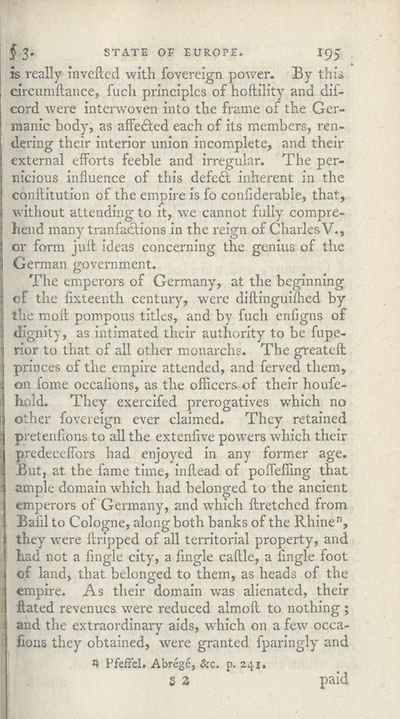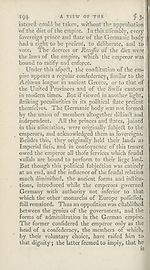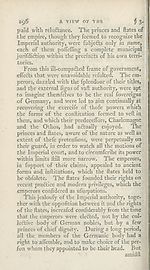Download files
Complete book:
Individual page:
Thumbnail gallery: Grid view | List view

§ J. STATE OF EUROPE. I95
is really invefted with fovereign power. By this
circumftance, fuch principles of hollility and dif-
cord were interwoven into the frame of the Ger¬
manic body, as affefted each of its members, ren¬
dering their interior union incomplete, and their
external efforts feeble and irregular. The per¬
nicious influence of this defedt inherent in the
conftitution of the empire is fo confiderable, that,
without attending to it, we cannot fully compre¬
hend many tranfadlions in the reign of Charles V.,
or form juft ideas concerning the genius of the
German government.
The emperors of Germany, at the beginning
cf the fixteenth century, w’ere diftinguifhed by
the moft pompous titles, and by fuch enfigns of
dignity, as intimated their authority to be fupe-
rior to that of all other monarchs. The greateft
princes of the empire attended, and ferved them,
on fome occaiions, as the officers of their houfe-
hold. They exercifed prerogatives which no
other fovereign ever claimed. They retained
pretenflons to all the extenfive powers which their
predeceffors had enjoyed in any former age.
But, at the fame time, inftead of poffefling that
ample domain which had belonged to the ancient
emperors of Germany, and which ftretchcd from
Baiil to Cologne, along both banks of the Rhine n,
they were ftnpped of all territorial property, and
had not a Angle city, a Angle caftle, a Angle foot
of land, that belonged to them, as heads of the
empire. As their domain was alienated, their
ftated revenues were reduced almoft to nothing ;
and the extraordinary aids, which on a few occa-
fions they obtained, were granted fparingly and
n Pfeft'el. Abregc, &c. p. 241,
5 a
paid
is really invefted with fovereign power. By this
circumftance, fuch principles of hollility and dif-
cord were interwoven into the frame of the Ger¬
manic body, as affefted each of its members, ren¬
dering their interior union incomplete, and their
external efforts feeble and irregular. The per¬
nicious influence of this defedt inherent in the
conftitution of the empire is fo confiderable, that,
without attending to it, we cannot fully compre¬
hend many tranfadlions in the reign of Charles V.,
or form juft ideas concerning the genius of the
German government.
The emperors of Germany, at the beginning
cf the fixteenth century, w’ere diftinguifhed by
the moft pompous titles, and by fuch enfigns of
dignity, as intimated their authority to be fupe-
rior to that of all other monarchs. The greateft
princes of the empire attended, and ferved them,
on fome occaiions, as the officers of their houfe-
hold. They exercifed prerogatives which no
other fovereign ever claimed. They retained
pretenflons to all the extenfive powers which their
predeceffors had enjoyed in any former age.
But, at the fame time, inftead of poffefling that
ample domain which had belonged to the ancient
emperors of Germany, and which ftretchcd from
Baiil to Cologne, along both banks of the Rhine n,
they were ftnpped of all territorial property, and
had not a Angle city, a Angle caftle, a Angle foot
of land, that belonged to them, as heads of the
empire. As their domain was alienated, their
ftated revenues were reduced almoft to nothing ;
and the extraordinary aids, which on a few occa-
fions they obtained, were granted fparingly and
n Pfeft'el. Abregc, &c. p. 241,
5 a
paid
Set display mode to:
![]() Universal Viewer |
Universal Viewer | ![]() Mirador |
Large image | Transcription
Mirador |
Large image | Transcription
| Antiquarian books of Scotland > Kings & rulers > History of the reign of the Emperor Charles V. > Volume 1 > (213) |
|---|
| Permanent URL | https://digital.nls.uk/109184887 |
|---|
| Description | By William Robertson. London : Cadell and Davies, 1798. |
|---|---|
| Shelfmark | ABS.1.76.13 |
| Additional NLS resources: | |
| Description | Thousands of printed books from the Antiquarian Books of Scotland collection which dates from 1641 to the 1980s. The collection consists of 14,800 books which were published in Scotland or have a Scottish connection, e.g. through the author, printer or owner. Subjects covered include sport, education, diseases, adventure, occupations, Jacobites, politics and religion. Among the 29 languages represented are English, Gaelic, Italian, French, Russian and Swedish. |
|---|

